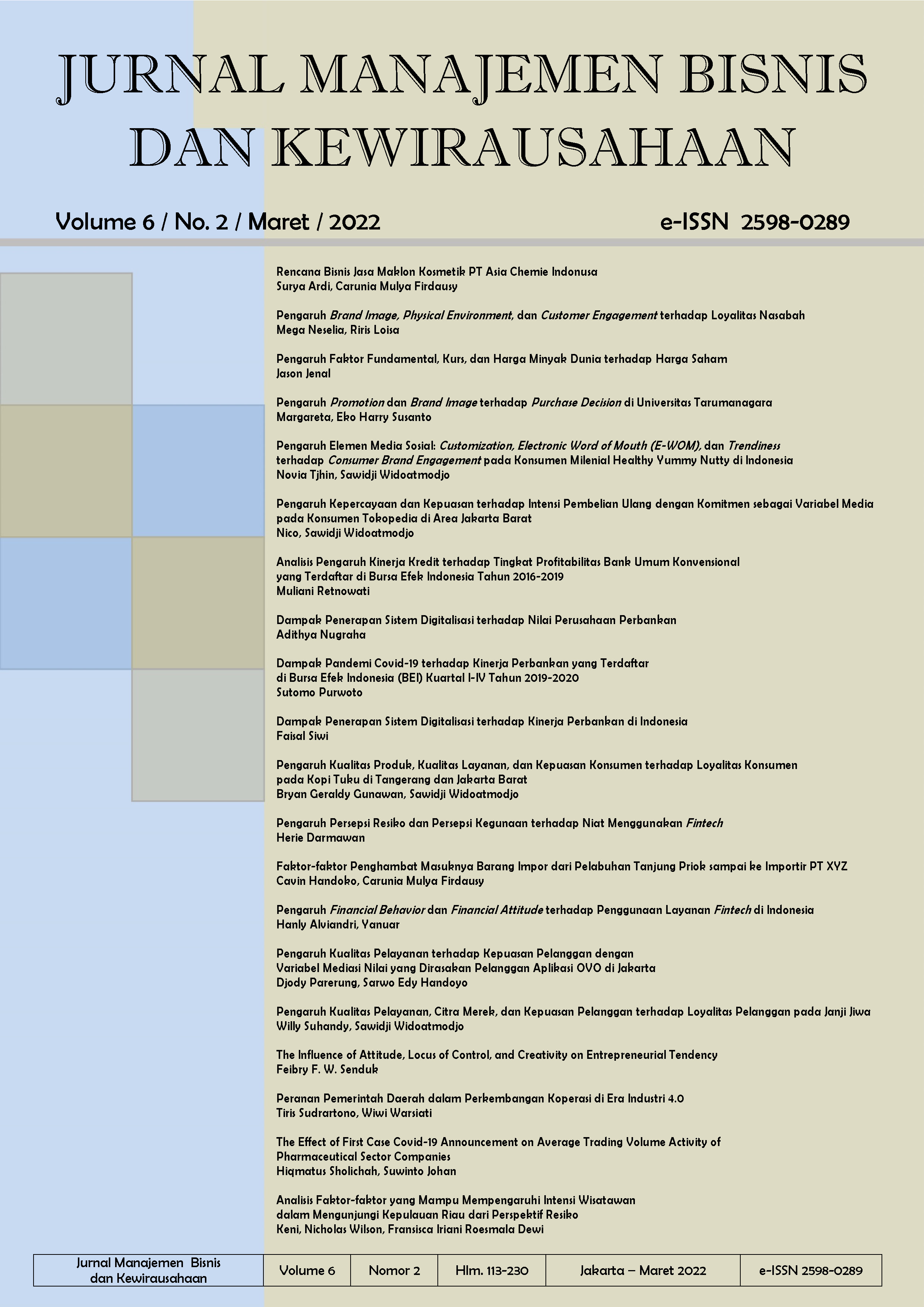Analisis Faktor-faktor yang Mampu Mempengaruhi Intensi Wisatawan dalam Mengunjungi Kepulauan Riau dari Perspektif Resiko
Main Article Content
Abstract
Tourism had become one of the industries which try to re-establish itself as the pillar of the Indonesian economy in the post-pandemic era, in which, it is important for practitioners or companies doing their business within the Indonesian tourism sector to fully understand which factors could affect people or tourists’ intention to visit certain destination place in Indonesia, in which, in this paper, is Riau Island. In this case, this study was conducted to fully assess several factors which could affect tourists’ intention to visit Riau Island, all these factors were comprised several risks which might affect tourists’ visit intention toward Riau, namely financial risk, psychological risk, time risk, and physical risk. This study implements a survey method, with a questionnaire was implemented as the main tool to collect the data from the respondents. A non-probability sampling method in the form of a convenience sampling method was also implemented to ensure the credibility and conformity of all respondents participating in this study. Meanwhile, a total of 400 data were collected from respondents who are tourists’ who’ve visited Riau Island for the past 3 years. Using the PLS-SEM method, data analyses results imply that all risks, namely financial risk, psychological risk, time risk, and physical risk had a significant effect on tourists’ intention to visit Riau Island.
Industri pariwisata merupakan salah satu industri yang saat ini sedang berjuang guna bangkit dari pandemi yang saat ini terjadi, yang dimana, penting bagi setiap pihak, seperti para praktisi dan pengusaha yang bergerak di sektor pariwisata di Indonesia untuk dapat memahami secara mendalam berbagai faktor ataupun aspek yang mampu mempengaruhi intensi wisatawan untuk berkunjung ke suatu lokasi wisata yang ada di Indonesia, yang dimana, lokasi wisata yang dimaksud dan dikaji pada penelitian ini adalah Kepulauan Riau. Berkaitan dengan hal ini, maka studi ini pun dilakukan guna mengkaji berbagai faktor yang mampu mempengaruhi intensi wisatawan di dalam berkunjung ke Kepulauan Riau dari perspektif resiko, diantaranya adalah financial risk, psychological risk, time risk, dan physical risk. Dengan menggunakan metode survei, kuesioner digunakan sebagai media utama guna mengumpulkan seluruh data dari responden. Selanjutnya, terkait dengan teknik sampling pada studi ini, jenis non-probability sampling berupa convenience sampling digunakan guna memastikan bahwa seluruh responden telah memenuhi berbagai kriteria yang ditentukan peneliti pada studi ini. Selanjutnya, sebanyak 400 responden yang merupakan wisatawan yang pernah berkunjung ke Kepulauan Riau dalam kurun waktu 3 tahun terakhir berpartisipasi pada studi ini. Dengan menggunakan metode PLS-SEM, hasil analisis data menemukan bahwa financial risk, psychological risk, time risk, dan physical risk berpengaruh signifikan terhadap pembentukan intensi wisawatan untuk berkunjung ke Kepulauan Riau.
Article Details
Section
This work is licensed under a Jurnal Manajemen Bisnis dan Kewirausahaan Creative Commons Attribution-ShareAlike 4.0 International License.
How to Cite
References
Ajzen, I. (1985). From intention to actions: A theory of planned behavior. In J. Kuhl & J. Beckman (Eds.), Action control: From cognition to behavior (pp. 11–39). Springer-Verlag Berlin Heidelberg.
Dash, A. (2021). Exploring visit intention to India for medical tourism using an extended theory of planned behaviour. Journal of Hospitality and Tourism Insights, 4(4), 418–436. https://doi.org/10.1108/JHTI-03-2020-0037
Dedeo?lu, B. B., Mariani, M., Shi, F., & Okumus, B. (2022). The impact of COVID-19 on destination visit intention and local food consumption. British Food Journal, 124(2), 634–653. https://doi.org/10.1108/BFJ-04-2021-0421
Fishbein, M., & Ajzen, I. (1975). Belief, attitude, intention and behavior: An introduction to theory and research. Addison-Wesley.
Keni, Lerbin, R., Aritonang, R., Pamungkas, A. S., & Wilson, N. (2022). An integrated analysis of factors affecting consumers’ purchase intention toward batik: a comparative study between Indonesia and Malaysia. International Journal of Management Practice, 15(1), 87–107. https://doi.org/10.1504/IJMP.2022.119924
Wilson, N., Keni, & Tan, P. H. P. (2019). The effect of website design quality and service quality on repurchase intention in the E-commerce industry: A cross-continental analysis. Gadjah Mada International Journal of Business, 21(2), 187–222. https://doi.org/10.22146/gamaijb.33665
Wilson, N., Keni, & Tan, P. H. P. (2021). The role of perceived usefulness and perceived ease-of-use toward satisfaction and trust which influence computer consumers’ loyalty in china. Gadjah Mada International Journal of Business, 23(3), 262–294. https://doi.org/10.22146/gamaijb.32106


